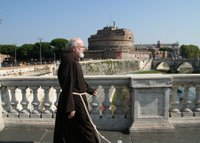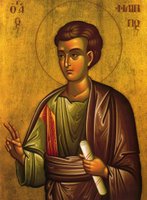It was announced in yesterday's edition of the
Catholic Times (no article online) that the Presbyteral Council met on September 5th and gave its consent to a plan to merge three parishes in my home city of Quincy, Illinois - including my home parish - into one parish.
All Saints (formerly St. John the Baptist [my home] and St. Rose of Lima parishes), Immaculate Conception and St. Boniface parishes are now, after a decree from Bishop George J. Lucas, united into the parish of Blessed Sacrament, using the church dedicated to the Immaculate Conception. Word is that my home church will be sold in the not too distant future.
It breaks my heart that this plan went through. It all happened so quickly and the people are very hurt and confused, myself included. I accept the Bishop's decision, though I do not understand it.
When I first learned of the possible merger I composed the poem, "In this Church..." which I
posted previously. I repost the poem below:
In this church I learned that God is love.
In this church I learned that God loves me.
In this church my father appeared to me - after his death - three times as if to say,
“I love you. I am watching you. I am caring for you. I will embrace you again.”
From this church my mother was buried.
In this church I made my first Confession.
In this church I received the Holy Eucharist for the first time.
In this church I learned to pray.
From this church my grandfather was buried.
From this church my cousin was buried.
From this church I hoped to be buried.
In this church I learned to serve the Holy Mass.
In this church I found joy.
In this church I found comfort.
In this church I found peace.
In this church I found my fulfillment.
In this church I heard God’s call.
In this church I responded to his call.
In this church I understood the unity and bond of the Mystical Body of Christ.
In this church I received the Anointing of the Sick.
From this church I was sent forth to study and be formed for the priesthood of Jesus Christ.
In this church I celebrated my first Solemn Mass of Thanksgiving.
In this church I wept and laughed and loved and prayed and listened and preached and was loved.
In this church I am at home.
In this church is all I have and all I have known and all I have loved.
In this church is my home.
But no more…
Now I can visit neither the place of my Baptism, the place of my Confirmation, the place of my first Confession, the place of my first Communion, the place of my first Anointing, the place of my first Mass, nor the place where I was formed. I feel terribly lost and homeless. All I have known feels torn away from my grasp and forever from my reach…
 This coming Sunday the Dead Theologians Society will meet for the first time at St. Anthony of Padua parish.
This coming Sunday the Dead Theologians Society will meet for the first time at St. Anthony of Padua parish.



 Do followers of a religion of peace holds signs such as this outside Westminster Cathedral:
Do followers of a religion of peace holds signs such as this outside Westminster Cathedral:




